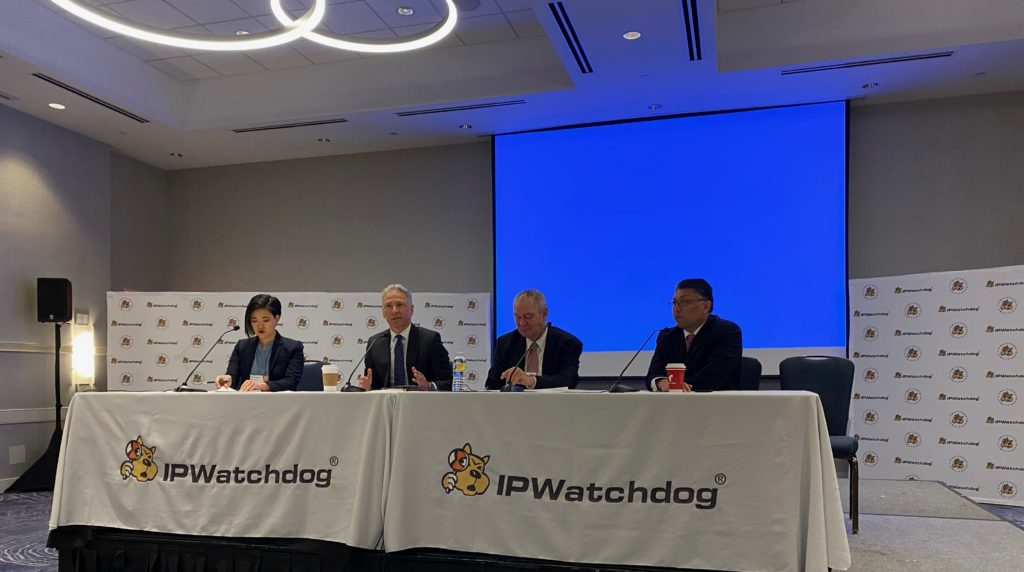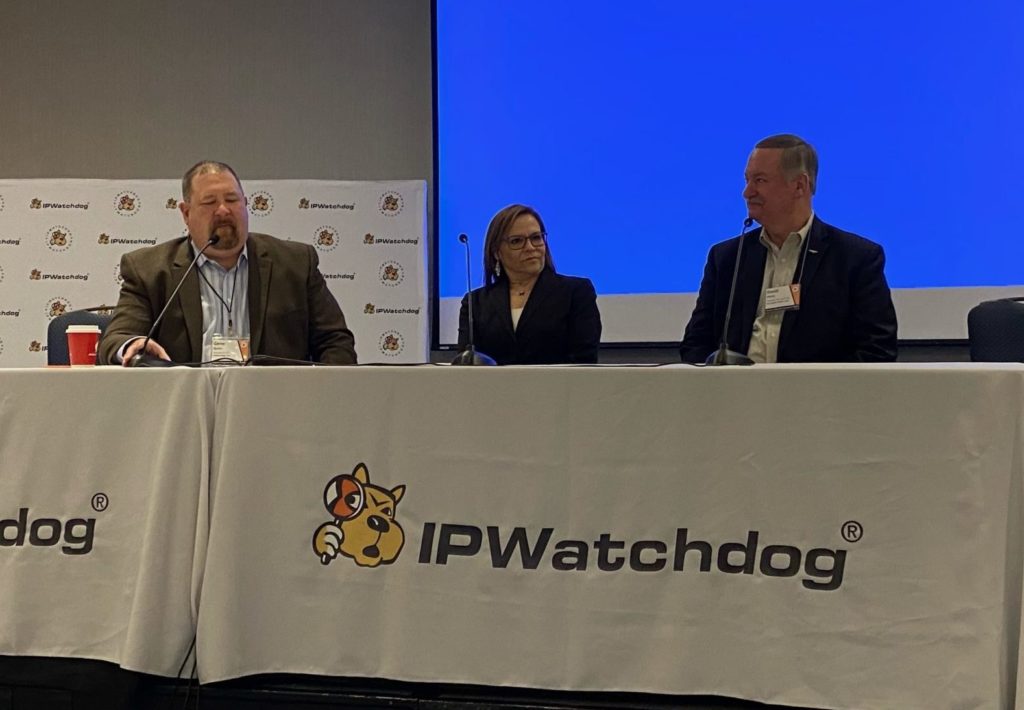“There’s a huge voice on the other side, no question, but I think we have to keep the faith.” – Andrei Iancu
 Speakers on day one of IPWatchdog’s Patent Litigation Masters program acknowledged that it’s easy for patent owners to become frustrated and disconsolate about how far the pendulum has swung away from encouraging effective patent protection but urged attendees to continue speaking up. As program sponsor and co-chair David Henry of Gray Reed put it, “I think we all have to become ambassadors for the patent system.”
Speakers on day one of IPWatchdog’s Patent Litigation Masters program acknowledged that it’s easy for patent owners to become frustrated and disconsolate about how far the pendulum has swung away from encouraging effective patent protection but urged attendees to continue speaking up. As program sponsor and co-chair David Henry of Gray Reed put it, “I think we all have to become ambassadors for the patent system.”
Henry spoke Monday on a panel about the U.S. Court of Appeals for the Federal Circuit’s recent habit of granting petitions for writ of mandamus to order Judge Alan Albright of the U.S. District Court for the Western District of Texas to transfer cases out of his court, largely to the U.S. District Court for the Northern District of California. Panelists speculated about the motivation for this focus on both the Eastern and Western Districts of Texas, with several agreeing that at least part of the trend is rooted in anti-patent sentiment. “Every time there’s a favorable forum for patentees, it gets harder to get into,” Wendy Verlander of Verlander LLP said.
 Event co-chair Meredith Addy of AddyHart P.C., who joined Henry and IPWatchdog Founder and CEO Gene Quinn to introduce the program Monday morning, said the difficulties for patent owners today are many; she is frustrated by the atmosphere and many clients don’t fully understand until they’re in it. “You’ve got to be ready to fight,” she said.
Event co-chair Meredith Addy of AddyHart P.C., who joined Henry and IPWatchdog Founder and CEO Gene Quinn to introduce the program Monday morning, said the difficulties for patent owners today are many; she is frustrated by the atmosphere and many clients don’t fully understand until they’re in it. “You’ve got to be ready to fight,” she said.
In addition to the recent challenges around venue, some of the topics explored on day one of the program included the lack of clarity on patent eligibility law, International Trade Commission (ITC) strategies, and the threats to companies being able to obtain injunctions on standard essential patents (SEPs).
Henry’s plea for attendees not to lose hope was echoed by former U.S. Patent and Trademark Office (USPTO) Director Andrei Iancu, who spoke on a panel titled “The Never-Ending Fight Over What is Fair, Reasonable & Non-Discriminatory (FRAND).” Iancu and his fellow panelists examined the various iterations of the Department of Justice’s (DOJ) Draft Policy Statement on SEPs, the most recent of which was proposed in 2021. Criticism of the latest version has been bipartisan, which is reason to be hopeful, Iancu said. He explained:
We have to maintain focus and make sure that this administration stays the course…. It’s kind of depressing in the courts on 101, and American Axle makes your head explode, but the solution is there – we’ve done it at the PTO. And on SEPs, there’s a continuous fight against them, but we made significant progress with the 2019 statement. [Even though] they’re trying to change it now…don’t lose hope. The response earlier this year to the 2021 SEP policy proposal is super encouraging; all the former PTO directors from the Obama and Trump administrations, all the [National Institute of Standards and Technology] NIST directors, most of the antitrust division directors [came out against changing the 2019 policy]. And who was in favor of changing it? Clearly, Big Tech and China. I’m quite optimistic that there is strong bipartisan support at multiple levels in the administration by individuals who still favor a strong patent system and understand that having a strong IP system is key. There’s a huge voice on the other side, no question, but I think we have to keep the faith.
During a panel on “Winning Alice and Mayo at the District Courts and on Appeal,” panelists on both the prosecution and litigation sides provided practical suggestions for getting patents through the eligibility gauntlet, as well as how the patent bar can help to unravel the uncertainty in the courts. One suggestion in response to a question by Jonathan Stroud of Unified Patents about how amicus briefs in the American Axle case at the Supreme Court should be focused, assuming it’s eventually granted, was to ask the Court to use the Patent Eligibility Guidance crafted by Iancu during his tenure with the USPTO as the structure for a new rule. However, some panelists were skeptical the Justices would sign on to that.
“We like rules and guidelines that are structured, but obviously the Court doesn’t,” said Josef Schenker of Ropes & Gray. “It’s a tension between what we like in terms of predictability versus how the Court handles law in general. It’s best to explain why the current regime is unworkable and provide some solutions but I wouldn’t be surprised if they punt [clear rules] to Congress.”
The Patent Litigation Masters program is taking place Monday and Tuesday this week at the Hyatt Regency Dulles in Herndon, VA and includes a number of prominent IP speakers. Day two will include panels on the Fintiv saga, litigation funding, and more.

![[IPWatchdog Logo]](https://ipwatchdog.com/wp-content/themes/IPWatchdog%20-%202023/assets/images/temp/logo-small@2x.png)

![[Advertisement]](https://ipwatchdog.com/wp-content/uploads/2024/04/Artificial-Intelligence-2024-REPLAY-sidebar-700x500-corrected.jpg)
![[Advertisement]](https://ipwatchdog.com/wp-content/uploads/2024/04/Patent-Litigation-Masters-2024-sidebar-700x500-1.jpg)

![[Advertisement]](https://ipwatchdog.com/wp-content/uploads/2021/12/WEBINAR-336-x-280-px.png)
![[Advertisement]](https://ipwatchdog.com/wp-content/uploads/2021/12/2021-Patent-Practice-on-Demand-recorded-Feb-2021-336-x-280.jpg)
![[Advertisement]](https://ipwatchdog.com/wp-content/uploads/2021/12/Ad-4-The-Invent-Patent-System™.png)






Join the Discussion
No comments yet.